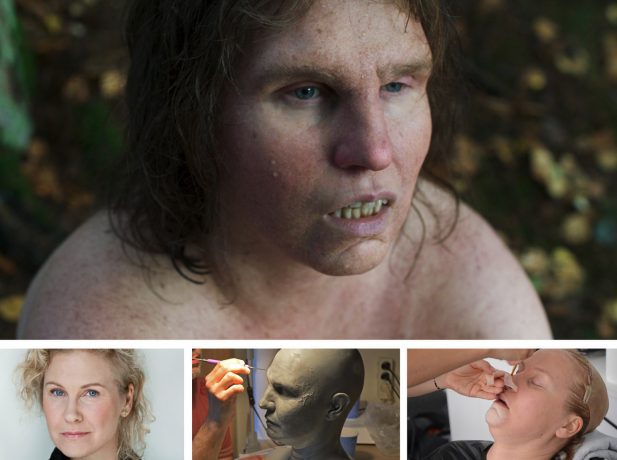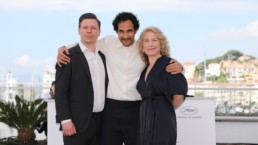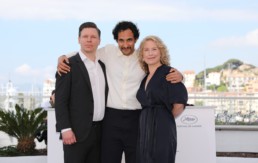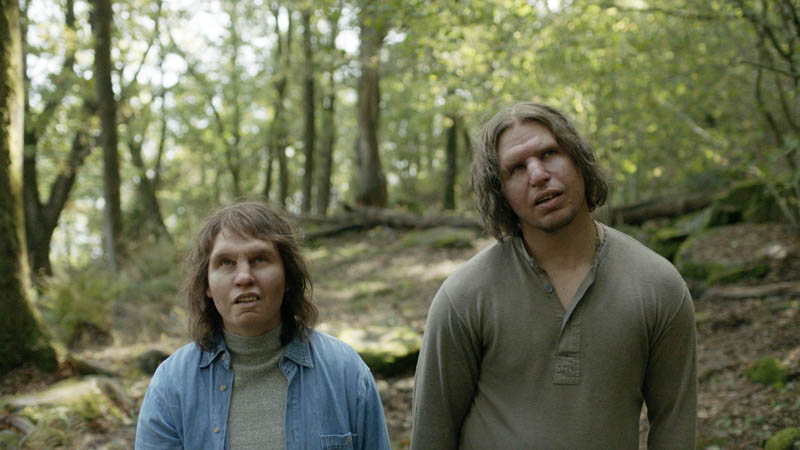Eva Melander: “It takes so much energy to keep calm”
This is a custom heading element.
On that Monday afternoon, the restaurant in The Hollywood Roosevelt Hotel was bustling with tourists taking Instagram selfies and businessmen deep in conversation. Sitting at a round table located discreetly in the back of the room, were Border director Ali Abbasi and actress Eva Melander who had just finished their drinks, leaving only a lemon and lime wedge near the empty cups. I sat down at their table, eager to talk about the Swedish fantasy thriller that was easily among my top films of 2018. In our interview, we talk about Scandinavian cinema, gaining 40 lbs., and more…
(Recently, Border was one of the films caught up in Oscar politics during the short-lived decision to cut out four categories from the broadcast, one of which included “Best Makeup and Hairstyling”, which was- shockingly- the only nomination the film received. Luckily, a last-minute reversal of that decision saw to it that Border would indeed get its deserved time in the spotlight.)
The reality of Scandinavian cinema
Ali: There’s a strange thing about the film industry in Scandinavia. Denmark, for me, is like a cultural colony of the United States. The Danish language is turning into “Danish with English words”. In these Nordic countries, about 70% of programming is in English. TV series, children’s shows, talk shows, everything. Then you have a totally different financing/political system. The United States has a very active role in the film industry, which makes a huge difference. What I’ve come to learn is that movies are made not because they are the best ideas, but because those are the movies that could be financed.
As a director, the main difference between Scandinavian vs U.S. cinema is the creative control you have. In Scandinavia, I have final cut unless I negotiate it away. Here, I don’t have final cut unless I negotiate to get it. It’s a night and day difference in that regard.
Magical realism inspired by South America
Ali: I started my career as a writer and have always been inspired by South American magical realism. It resonated with my world views, especially the political/social climate in Iran- where I come from- because my reality could be so strange. Things could be hard to comprehend even if it happened in front of your eyes. On a good day, you become interested in magical realism, on a bad day you become really paranoid and interested in conspiracy theories. This is like a disease in the Middle East, you know, people thinking ‘Americans took our oil’ and all these other countries ‘conspiring’ against us. As a political ideology, I think it’s terrible. But as a literary cinematic device, I think it’s fascinating.
Eva: When I was a kid and watched movies, I was often very bored because I didn’t think the content connected to the world I was living in. I was obsessed with the [lack of common people] on television, not just the “movie stars.” I was a very social-realistic kid haha.

Courtesy of Göran Lundström
Prosthetics taught Eva patience
Eva: I love transformation. I like to put characters on the screen that you don’t commonly see and this role was the ultimate transformation. It took 4 hours to put on [prosthetics and makeup], so when we would start shooting at 6.30 am, I’d be in the makeup chair at 2 am. I’d work over 15 hours a day- 4 hours of prosthetics, 10 hours of shooting, and 1 hour to take everything off. I just had to save my energy in every moment, those 4 hours consisted of me basically trying to meditate through it all. I would listen to different mindfulness apps, I felt like an untrained Buddha! I learned a lot about patience. I gained 40lbs.
Ali: This is the first time it has actually struck me just what that process meant! While you were talking I was thinking about if I had any similar experiences, and I just thought of my flight to Los Angeles that was 12 hours. If I was in your position, not able to move, I would kill myself! I would start cutting myself just to see something happen! You were able to pull this off because you have an inner calm.
Eva: Oh, you could easily go crazy. It takes so much energy to keep calm. But it had to be done.
The importance of being ignorant
Ali: I gave a talk at the London Film Festival about the importance of being ignorant. Had I known what the transformation process was [for Eva], I would’ve been so stressed and thought so much about it. It would have affected everything. And this isn’t just the prosthetics, this is all the components it takes when making a movie. Of course, if everybody’s ignorant that would be a problem, but I think it’s good to limit the scope of what you worry about.
Eva: It was so important for me to just be in the moment. If I was thinking about what I was about to go through, I probably wouldn’t have been able to do it. Throughout this process, I actually surprised myself.
Courtesy of Ali Abbasi/Still 21
The transformation process didn’t scare Eva away
Eva: Absolutely! If I had the flexible schedule, I would take on another role like this one.
Ali: I remember we were in San Francisco, and Eva was talking about Alicia Vikander and how she gained 10lbs of muscle and cut her hair [to play Lara Croft] in Tomb Raider and that was big news in Variety or something. And Eva was like, ‘Ha! I gained 40lbs!’ Haha
You’re only as good as your last movie
Eva: You never know what’s going to come out of what you do. That’s part of the pleasure. I was just so happy that we were going to have the World Premiere at Cannes because I knew people would be interested it in. From then until now, yes, it has been a great success.
Ali: My biggest wish for you, Eva, is that now you’ve gotten this boost of visibility and from now until you die, you have the opportunity to do 1,001 crazy characters.
Eva: Awww, that’s awesome.
Ali: As for me, this is an old, tired saying, but I think it’s very true: You’re only as good as your last movie. Right now, I feel good. But in a few years’ time that can change very easily. What I really want from this is that I’m able to continue working in my little corner. I feel like I’m at a point where people who need to know me, know me. People who don’t need to know me, don’t know me. I’m not afraid of going into the street and having people stop me for my autograph. If I can keep working like this, then I’m really happy.
Morgan Rojas
Certified fresh. For disclosure purposes, Morgan currently runs PR at PRETTYBIRD and Ventureland.



